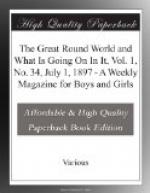The blubber is also arranged by nature as a means for keeping their bodies warm. True fishes are cold-blooded animals, and not sensible to differences of temperature.
All these different facts make people think that at some very remote period whales were land animals.
EDITOR.
THE GREAT ROUND WORLD AND THE PEOPLE WHO LIVED ON IT.
CHAPTER I.
There was once a man who lived with his family on a large farm in a fine valley sheltered by high mountains. The farm had need to be large, for the family was numerous. There were the old man’s children and grandchildren, and these again had sons and daughters, and they all lived together, in many huts, which made a village or town. Of course they all were more or less nearly related to one another, and all called the old man father. He was their head and chief—their king, and his word, his commands, were their only laws. He was assisted and advised by the oldest and wisest among the men, who met regularly to discuss the family’s affairs, and formed a sort of senate or council of elders. When great things had to be talked over and settled, things which interested everybody alike, the whole family was called together, and had a mass-meeting after working hours.
The family knew nothing of the great round world but their own farm. In fact, they did not care whether there was any world outside of their mountains, because they had no need of any. All they wanted, for food, clothing, or shelter, they found or raised on their own land. They had pure running water to drink and to fish in; woods to hunt in and cut down for fuel and building timber; meadows for the flocks and herds which gave them milk and flesh, hides and wool; broad fields stretched under the sun, green with the tender sprouting crops or golden with the ripening harvest.
The family had no idea how long they and their forefathers before them had owned and lived upon the farm. If they ever thought of it at all, they probably thought they had been there always. Really, it must have been a very, very long time—they were so thoroughly settled, so well acquainted with the land and everything on it; then they were so numerous and knew so much. It must have taken a tremendous length of time to learn all about farming and dairy work, about building, and weaving, and making things,—to have found out so much about the stars, the coming and going of the moon, the years and months which it makes,—to have so many set customs, and a religion with prayers and worship,—and lastly, to have invented writing and no end of useful arts, requiring skill and long practice.
There came a time when it was no longer a family, but a great many families, which could not go on living so close together. So they began to build separate homesteads, all around the old home, but farther and farther away from it. They went on living exactly in the same way, only each new homestead had its own head. The tie of blood was strong and the separated families kept it sacred, even if they quarrelled now and then, as neighbors and relatives will at times.




